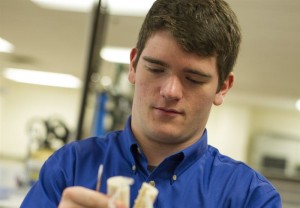
ARLINGTON – A new partnership between The University of Texas at Arlington and the Arlington Independent School District will offer high school students classroom and enrichment experiences that put them on a path to success in the fields of science, technology, engineering and math.
The new STEM Academy will open in August 2015 at Martin High School, with students from across the district selected the previous spring. When the program is fully implemented, 100 students each from grades 9 through 12 will have the opportunity to choose one of four pathways: engineering, biology/biomedical science, computer science and math/science.
UT Arlington College of Science and College of Engineering faculty and staff will work with instructors at the high school level to align and enhance curriculum in the STEM academy. Junior and seniors in the program will also have opportunities to take dual credit classes that help them meet STEM college requirements before high school graduation and take advantage of off-campus opportunities for innovative learning.
“The STEM Academy is one more step toward an increasingly strong partnership between UT Arlington and one of the state’s largest school districts to create opportunity and to ensure that students are well prepared to succeed in college,” UT Arlington President Vistasp Karbhari said. “Together, we will ignite students’ interest in the world of inquiry, expand their horizons and show them how they can achieve their dreams in the fields of science, engineering and math.”
STEM Academy students also will be able to advance their STEM education outside the classroom with opportunities that include: internships, mentorships, job shadowing, community service, enrichment programs and a summer academy.
“The new STEM Academy will deliver on our commitment to science and technology instruction and our focus on preparing our students to excel in higher education or the career of their choice,” Arlington ISD Superintendent Marcelo Cavazos said. “There is a need for more STEM graduates in our country, and we feel strongly about helping students in our district lay the groundwork for a future in the high-demand fields of science, technology, engineering and math.”
UT Arlington and the Arlington school district already collaborate on a number of innovative programs. In 2013, district and campus leaders announced Bound for Success, an early admissions initiative aimed at increasing the number of high-achieving high school students who earn a college degree. UT Arlington also operates GO Centers at Arlington campuses through which University students help high school students, especially those who are the first in their family to attend college, prepare to apply for college admission, scholarships and financial aid.
In recent years, the College of Science also has teamed with Arlington schools in the National Science Foundation-funded GK-12 STEM fellows initiative. That program puts doctoral level math students inside district classrooms to bolster instruction and introduce math research.
Ashley Purgason, assistant dean in the UT Arlington College of Science, said the STEM Academy is an exciting addition to the university’s relationship with area schools. Nationally, less than half of students who enter public universities as STEM majors graduate with a STEM degree. Offering support and encouragement early on could change that, administrators believe.
“Creating better prepared and more engaged high school students in the STEM fields will undoubtedly lead to more successful college students and, ultimately, graduates who will influence North Texas and beyond,” Purgason said. “This partnership gives the UT Arlington College of Science and College of Engineering faculty and administrators the opportunity to take an active role in guiding promising students before they even graduate high school.”




